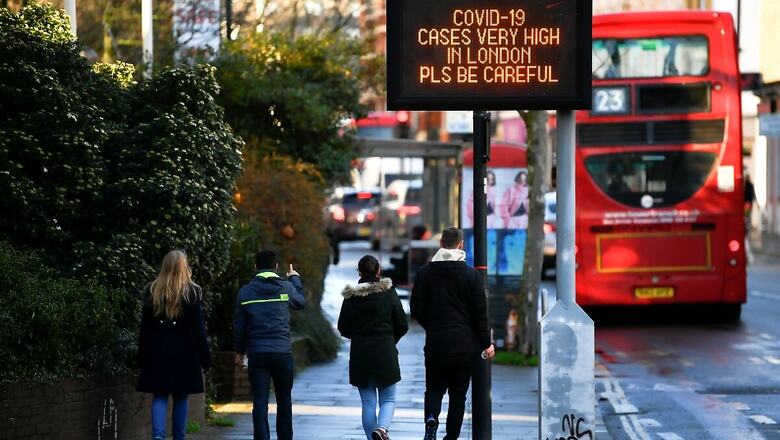
views
As the first mass coronavirus inoculation campaign began in the United Kingdom, PM Johnson announced fresh curbs to arrest the spread of an unseen strain of the novel coronavirus- hitherto. It appears to be more contagious than earlier variants of the pathogen.
“It is with a very heavy heart I must tell you we cannot continue with Christmas as planned,” Prime Minister Boris Johnson announced at a press conference, just days after he said it would be “frankly inhuman” to cancel the holidays. “I sincerely believe there is no alternative open to me,” he added.
A stringent tier-4 lockdown has been imposed in the worst-affected parts of the country, with restrictions on household mixing in London and the southeast, while in other parts of the country socialising will be allowed only on Christmas day.
In response, several European countries on Sunday banned flights coming from the UK. Netherlands and Belgium were among the first countries to announce the ban, with Germany still mulling the decision. Meanwhile, in India, the Health Ministry called an urgent meeting of its Joint Monitoring Group to discuss the development.
What we know about the new strain
Although mutations of the Sars-CoV-2 have been reported in recent months from various parts of the world, the VUI-202012/01 variant traced in the UK has raised cause for concern. Addressing a press conference, PM Johnson said that preliminary data evidenced that it is 70% more transmissible.
The New and Emerging Respiratory Virus Threats Advisory Group (Nervtag), an expert committee of the UK Department of Health and Social Care, in its report concluded that it has “moderate confidence that VUI-202012/01 demonstrates a substantial increase in transmissibility compared to other variants.” The UK government’s chief medical officer Chris Whitty was also quoted as saying by The Guardian, “Nervtag now considers that the new strain can spread more quickly. We have alerted the World Health Organization and are continuing to analyse the available data to improve our understanding.”
While the high transmissibility rate is alarming, there is no evidence yet of it causing severe illness or mortality rate. Moreover, scientists are still trying to discern why the strain is spreading faster. Stuart Neil, a professor of virology at King’s College London told Guardian that the new variant was associated with 10-15 percent of cases in certain areas until a few weeks ago but jumped to roughly 60% cases in London.
Mutation precedents
Mutation refers to a change in the genetic sequence of the virus which occurs as a result of its reproduction. The virus spreads by attaching itself to a host cell and injecting its genetic material into the cell. However, when the host tries to fight this reproduction, the virus finds new ways to survive, thereby adapting and evolving.
Most mutations, however, are not dangerous. Since the onset of the coronavirus pandemic, thousands of mutations have occurred in the novel coronavirus, but only a few have led to panic.
Parallel to the UK, a new variant of the virus was recently discovered in South Africa, which has accounted for a second wave in the country. Health authorities discovered that the 501.V2 variant was responsible for critical illness in younger patients with no comorbidities, Health Minister Zweli Mkhize said. Like the UK, concerns about a spread of the disease due the upcoming holidays led President Cyril Ramaphosa to put in place strict measures in the country’s coastal areas.
The evidence that has been collated, therefore, strongly suggests that that the current second wave we are experiencing is being driven by this new variant. #SARSCOV2MediaBriefing— Dr Zweli Mkhize (@DrZweliMkhize) December 18, 2020
Earlier this year, the D614G mutation also alarmed the world. It quickly became the dominant strain, responsible for the bulk of the pandemic. Concern over the mutation grew after scientists in Malaysia discovered the strain in two clusters in July. The country’s director-general of health Noor Hisham Abdullah had described it as being 10 times more infectious.
More recently, Denmark culled millions of minks after a mutated virus associated with mink farms was detected in several patients. According to the WHO, preliminary findings suggested that this “cluster 5” variant moderately decreases the sensitivity to neutralising antibodies. To date, Denmark has identified seven unique mutations in the spike protein of SARS-CoV-2 among variants co-circulating in mink and humans, the WHO website states.
In October, a study had suggested that another strain, traceable to Spain, was responsible for most Covid-19 cases in the UK, according to a report.
Will current vaccines stand the test?
News of the new strain in the UK has raised one question of optimal importance: Will the new mutation be resistant to the vaccines that are currently being rolled out?
Stuart Neil of King’s College said that changes in the mutated virus’ spike protein, which allows the virus to infiltrate host cells, is of most concern to scientists. The mutation on the spike protein may enhance the virus’s ability to interact with a receptor called ACE-2, giving it a growth advantage, he said. The spike protein is the part of the virus that the vaccines are designed to target, which is why mutation could hinder the vaccine’s effectiveness.
Experts, however, are fairly confident that the vaccines are well-equipped to stand the test. It has widely been suggested that the vaccines being developed and those currently in circulation have been tested on various mutations. As Neil explained, coronavirus vaccines are designed in a manner that allows antibodies to target the spike protein on the virus. “But the vaccines target multiple regions on the spike, while a mutation refers to a change in a single point. So, if there is one mutation, it does not mean vaccines would not work,” Dr Gagandeep Kang, a professor at Christian Medical College in Vellore, was quoted as saying by Indian Express. That being said, scientists have cautioned that high transmissibility of the new strain alone can lead to more infections and deaths.
It would take the virus years to mutate to an extent that the current vaccines fail to tackle it, according to some experts. In fact, scientists are worried that mass vaccination may make the virus resistant to the immune response, according to NYT. “As selection pressure increases with mass vaccination, I think these mutants will become more common,” Deepti Gurdasani, a clinical epidemiologist at Queen Mary University of London was quoted in the report.
Read all the Latest News, Breaking News and Coronavirus News here




















Comments
0 comment